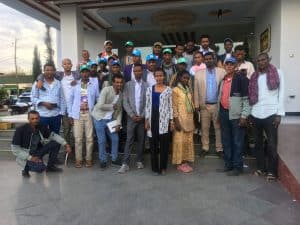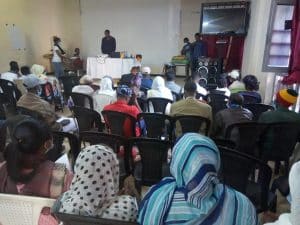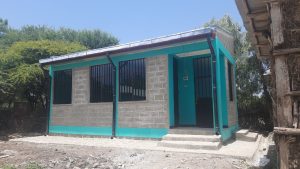Over the past five years, the 4R Nutrient Stewardship Project (4R-NSP) has achieved remarkable success in uplifting rural communities’ socio-economic status by strengthening co-operatives, through the Rural Commercial Women Groups (RCWGs), and Village Savings and Loan Associations (VSLAs). These interventions have significantly improved market linkages, access to financial resources, and smallholder farmers’ productivity. This transformation is best illustrated through the tangible benefits and growth experienced by these communities.

Multi-purpose co-op leaders at a training session in Ethiopia.
Through the project, the co-operatives have shown tremendous progress in market linkage and storage capacity. In Ethiopia, 7,273 co-operative members were linked to the market, leading to the procurement and sale of 1,028 tons of farm produce worth ETB 42,874,960. This achievement represents 100 per cent of the target for women and 85 per cent for men, demonstrating the inclusive nature of the co-operatives’ efforts. Surveys indicate 95 per cent of female-headed households and 85 per cent of male-headed households acknowledged the co-operatives’ role in securing better prices for their produce. This has been a game-changer for many families, enabling them to earn a fair income and invest back into their farms.
To further bolster these achievements, the project facilitated federal-level meetings, helping co-operatives establish market linkages with food processing companies and input suppliers. As a result, co-operatives received training on quality standards and signed Memorandums of Understanding with various suppliers. This enhanced their ability to provide high-quality produce and access essential agricultural inputs, creating a sustainable and efficient agricultural ecosystem. These strategic partnerships have opened new markets and ensured co-operative members received fair and timely compensation for their hard work.
In Ghana, the project introduced co-operatives to storage facilities in East Gonja, Nanumba North, and Kpandai districts. Awareness of these economic benefits was high, with 80 per cent of focus group participants recognizing their value.

Training for Savings and Credit Co-operative Organization accountants in Ethiopia.
The Rural Commercial Women’s Groups bridged the gap between smallholder farmers and markets. In Ethiopia, the project established group farms, which served as entry points for co-operative business activities. This initiative enhanced group cohesion and provided a platform for members to collaborate on agricultural production and to market their produce collectively. The group farms sense of community and shared responsibility has driven productivity and ensured all members benefit from the collective efforts.
The RCWGs also benefited from improved access to productive resources. In Senegal, the project helped 50 groups obtain equipment, such as seeders, multipurpose millers, motorized tricycle-wagons, seeds, and fertilizer. Additionally, all group members accessed credit for production and micro-businesses through their local VSLAs, ensuring they had the financial support to enhance their farming activities. This access to credit has empowered women to be in leadership roles within their communities and improve their livelihoods through diversified income sources.
VSLAs have been instrumental in providing financial support to rural communities. In Ghana, the project ensured groups continued to benefit from VSLAs and established links with the Salaga Farmers’ Cooperative for additional financial access. This approach effectively implemented4R practices on both group and individual farms, significantly boosting agricultural productivity. The financial literacy and management skills gained through VSLAs have also equipped members with the knowledge to make informed decisions about their investments and savings.
Moreover, VSLAs facilitated access to timely financial resources, which is critical for the adoption of best agricultural practices and technologies. The project observed that access to finance from VSLAs and the Project Loan Fund greatly enhanced the adoption of improved agricultural practices, particularly in the project’s fifth year. This timely access to financial resources ensured that farmers could invest in high-quality seeds, fertilizers, and other inputs, leading to increased yields and improved food security.

Savings and Credit Co-operative Organization members saving at a new office renovated by CDF Canada in Ethiopia.
The efforts of co-operatives, RCWGs, and VSLAs substantially improved the livelihoods of smallholder farmers. In Ethiopia, 79 per cent of female-headed households and 87 per cent of male-headed households reported that their co-operatives helped them access storage facilities, while 100 per cent of female-headed households and 85 per cent of male-headed households acknowledged the role of co-operatives in securing market access. The renovated Multi-purpose Co-ops (MPC) warehouses stored 57.4 tons of farm produce, benefiting 895 smallholder farmers by providing market linkages and storage solutions. These storage solutions reduced post-harvest losses and ensured farmers can sell their produce for the best prices.
In Ghana, the project assisted 2,564 co-operative members in accessing various productive resources. The Zonal co-operatives facilitated access to agrochemicals and fertilizers at reduced costs, further supporting the farmers’ needs. This substantial improvement underscores the project’s impact on enhancing agricultural productivity and ensuring that farmers have the necessary resources to cultivate their crops effectively.
The project has transformed rural economies by empowering co-operatives, RCWGs, and VSLAs. These groups have improved market access and financial support for smallholder farmers as well as fostered community cohesion and resilience. The positive impact on agricultural productivity and economic stability underscores the importance of continued support and development of these rural institutions.
The 4R-NSP success serves as a testament to the power of collective effort and the transformative potential of well-structured support systems in rural communities.